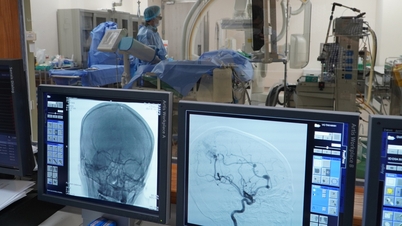
The brain has a "garbage collection system" that is most active when we sleep - Photo: AI
According to SciTechDaily, unlike other organs in the body that have a lymphatic system to remove waste, the brain does not have its own lymphatic vessels. For many years, scientists were confused about how the brain handles waste.
It was not until about 12 years ago that the glymphatic system was discovered and described as a mechanism for "dumping" toxic substances from the brain.
This process is facilitated by cerebrospinal fluid, the fluid that surrounds the brain and spinal cord. CSF moves around blood vessels in the brain, flowing into the spaces between nerve cells to collect waste and then draining it out through large veins. Experiments on mice have shown that the glymphatic system is most active during sleep, with its ability to clear waste significantly increased.
One of the substances this system removes is amyloid beta (Aβ), a protein that accumulates to form plaques in the brain. Along with tangles of tau protein, amyloid plaques are a key feature of Alzheimer's disease, the most common form of dementia.
In humans and mice, studies have shown that Aβ levels in the cerebrospinal fluid increase during wakefulness and decrease rapidly during sleep. However, some studies in mice have shown the opposite, suggesting that glymphatic activity may vary depending on the time of day. This suggests that the mechanism is still unclear.
In humans, adequate sleep benefits brain health. In addition to improving memory and cognitive function, sleep is also directly related to the elimination of toxins.
An experiment in healthy adults showed that after just one night of total sleep deprivation, Aβ levels in the hippocampus, an area important for memory, increased significantly. This strengthens the hypothesis that the glymphatic system in humans is also highly active during sleep.
Chronic sleep disorders such as sleep apnea or prolonged sleep deprivation are associated with dementia.
Sleep apnea is a condition in which breathing stops repeatedly during the night, depriving the brain of oxygen and the body of sleep. Both factors can promote the accumulation of toxins. In fact, sleep apnea has been linked to an increased risk of dementia. Notably, when patients are treated, their ability to clear Aβ from the brain also improves.
Insomnia, a condition in which difficulty falling asleep or staying asleep, has also been linked to a higher risk of dementia. However, it is not clear whether treating insomnia directly reduces toxins in the brain.
These findings suggest that adequate and quality sleep is important for maintaining a healthy brain. However, science has not yet been able to definitively confirm that treating sleep disorders can reduce the risk of dementia by affecting the glymphatic system.
Scientists are now continuing research, for example measuring blood levels of Aβ and tau over a 24-hour period in sleep apnea patients, before and after treatment, to better understand the impact of sleep on the brain's "cleaning" ability.
Another approach is to test orexin receptor antagonists, a class of drugs used to treat insomnia, to see if they help increase Aβ clearance.
While there are many uncertainties, one thing is clear: quality sleep is the foundation for brain health. If you have trouble sleeping, suffer from sleep apnea, or are concerned about your memory and cognitive abilities, see your doctor for advice and treatment.
Source: https://tuoitre.vn/thieu-ngu-dan-den-dieu-dang-so-ma-it-nguoi-biet-20250918194824717.htm





![[Photo] General Secretary To Lam attends the opening of the 1st Government Party Congress](https://vphoto.vietnam.vn/thumb/1200x675/vietnam/resource/IMAGE/2025/10/13/1760321055249_ndo_br_cover-9284-jpg.webp)









































































































Comment (0)